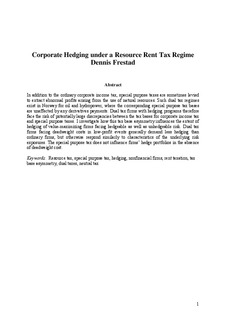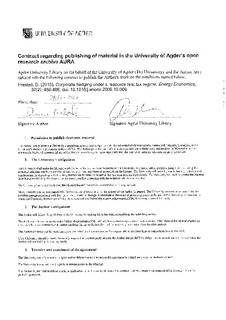| dc.contributor.author | Frestad, Dennis | |
| dc.date.accessioned | 2011-02-01T09:51:10Z | |
| dc.date.available | 2011-02-01T09:51:10Z | |
| dc.date.issued | 2010 | |
| dc.identifier.citation | Frestad, D. (2010). Corporate hedging under a resource rent tax regime. Energy Economics, 32(2), 458-468. doi: 10.1016/j.eneco.2009.10.009 | en_US |
| dc.identifier.issn | 0140-9883 | |
| dc.identifier.uri | http://hdl.handle.net/11250/135975 | |
| dc.description | Accepted version of an article in the journal: Energy Economics. Published version available on Science Direct: http://dx.doi.org/10.1016/j.eneco.2009.10.009 | en_US |
| dc.description.abstract | In addition to the ordinary corporate income tax, special purpose taxes are sometimes levied to extract abnormal profits arising from the use of natural resources. Such dual tax regimes exist in Norway for oil and hydropower, where the corresponding special purpose tax bases are unaffected by any derivatives payments. Dual tax firms with hedging programs therefore face the risk of potentially large discrepancies between the tax bases for corporate income tax and special purpose tax. I investigate how this tax base asymmetry influences the extent of hedging of value-maximizing firms facing hedgeable as well as unhedgeable risk. Dual tax firms facing deadweight costs in low-profit events generally demand less hedging than ordinary firms, but otherwise respond similarly to characteristics of the underlying risk exposures. The special purpose tax does not influence firms' hedge portfolios in the absence of deadweight cost. | en_US |
| dc.language.iso | eng | en_US |
| dc.publisher | Elsevier | en_US |
| dc.title | Corporate hedging under a resource rent tax regime | en_US |
| dc.type | Journal article | en_US |
| dc.type | Peer reviewed | en_US |
| dc.subject.nsi | VDP::Social science: 200::Economics: 210 | en_US |
| dc.source.pagenumber | 458-468 | en_US |

